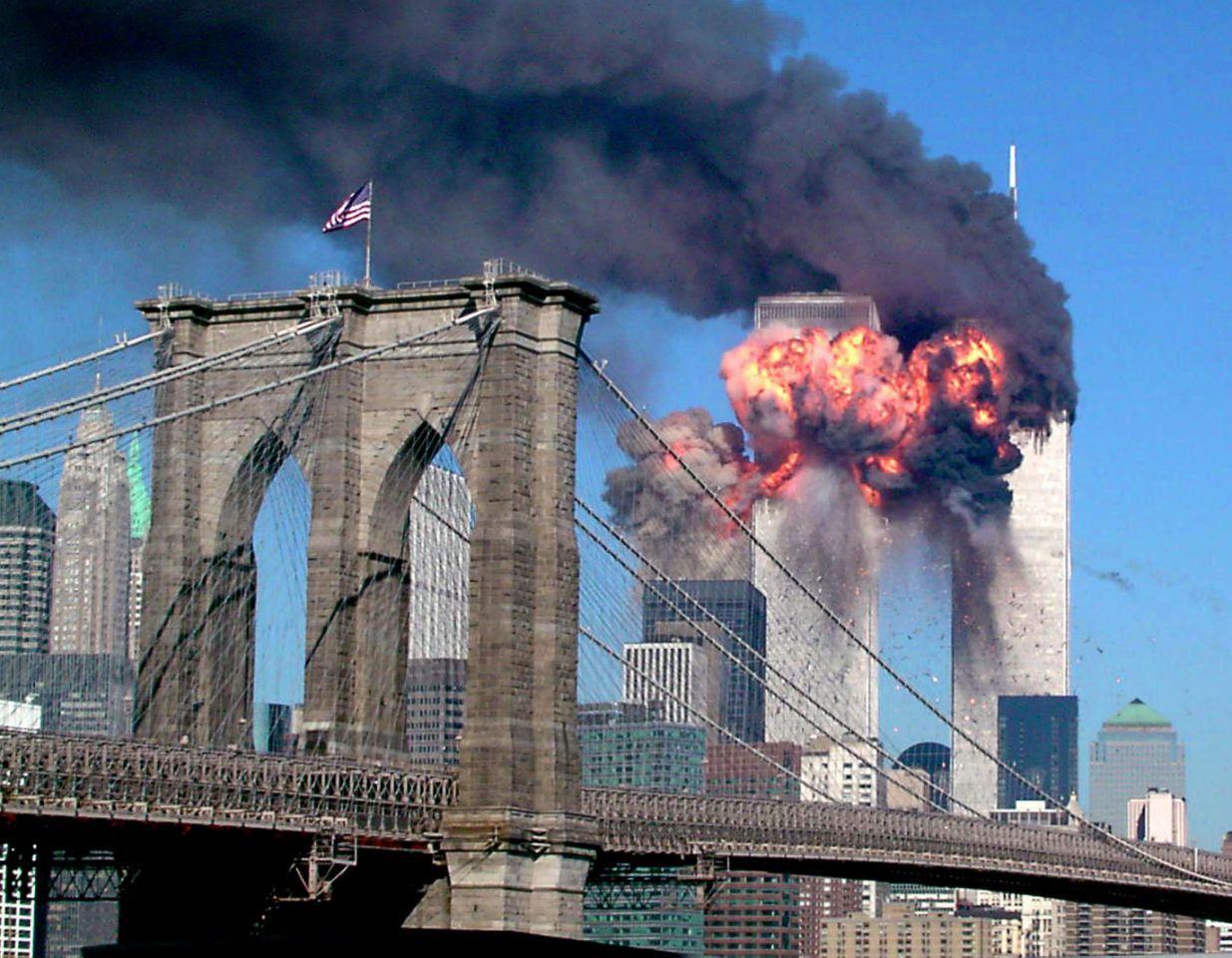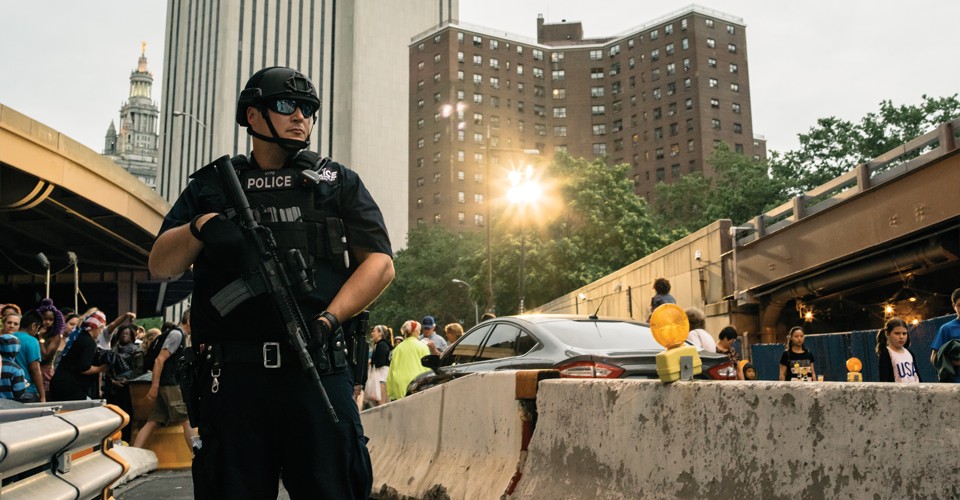Fifteen years ago this September 11, 19 terrorists, using four jetliners as guided missiles, killed 2,977 people and wrapped the country in fear. It was the first unrelenting attack on American soil since the bombing of Pearl Harbor, which was a far-off military base. This massacre hit the center of our government and blasted away part of our most iconic skyline. It left a stench that New Yorkers could smell weeks later as remains continued to be recovered from the ashes.
Suddenly, we were vulnerable. Not just to disease, tornadoes, accidents, or criminals, but to the kinds of enemies that had always threatened others but never us.
In 2001 I was a teenager living in Nigeria. I was privileged to have access to cable news in those days so I was glued to CNN and was thinking to myself is this the start of the 3rd world war? Like many others I have not really heard of Al Qaeda so the first one was an accident till the second tower was hit and then a third plane hit the Pentagon just outside Washington, D.C., and the fourth plane crashed in a field in Pennsylvania. I called my dad and asked him if he had seen the news and if he had called my mother who lived in the U.S at the time. He confirmed the family in the U.S were safe and said America needs to pray. I was interested to see how the U.S was going to react once I had realized and heard from experts on CNN that the homeland had been attacked. As young as I was I understood that America was a super power and will go to any extent to defend its people even if it meant a world war.
Days later as I continue to stick with the developments of the horrible terror on the country I was going to be calling home once I graduated high school. I began to learn of the American resolve, I saw how a people could come together as one nation under God just like the pledge of allegiance says and I knew that the country will pull together and I didn’t matter how long it will take the perpetrators of the evil were going to be brought to justice.
President Barack Obama remembers that after the second plane hit, he left the Chicago building that housed his state-Senate office. “I stood in the street and looked up at the Sears Tower, fearing it might be a target, too,” he told me in a recent email exchange, adding, “I remember rocking Sasha to sleep that night, wondering what kind of world our daughters were going to grow up in.” He continued, “With nearly 3,000 people killed in the places where we lived our daily lives, there was a feeling that our homeland was truly vulnerable for the first time.”
Fifteen Years Later
The United States is still scarred by the unfortunate events of September 11, 2001. Fifteen years ago, the United States wasn’t officially engaged in any wars. Only a few people had ever heard of al-Qaeda or Osama bin Laden, and ISIS didn’t even exist.
America deported half the number of people it does today. The surveillance state was a fraction of its current size. And perhaps hardest to believe Americans didn’t have to take off their shoes to get through airport security.
America’s involvement in the War on Terror prompted by the 9/11 terrorist attacks resulted in a dramatic change in the nation’s attitudes and concerns about safety and vigilance. It ushered in a new generation of policies like the USA Patriot Act, prioritizing national security and defense, often at the expense of civil liberties.
These changes continue to have ripple effects across the globe, particularly in the Middle East, where American-led military operations helped foment rebellions and ongoing warfare throughout the region.
Below are five of the many dramatic impacts:
- Ongoing wars
Less than a month after 9/11, U.S. troops invaded Afghanistan in an attempt to dismantle al-Qaeda, the terrorist group that claimed responsibility for the attacks and remove the Taliban government harboring the group. Two years later, in March 2003, the United States invaded Iraq and deposed President Saddam Hussein. Although not directly linked to the terrorist attacks, Hussein was suspected of producing weapons of mass destruction (none were ever found), and the invasion was a key part of America’s newly launched War on Terror, under the leadership of President George W. Bush.
The U. S military involvement in Afghanistan turned into the longest-running war in her history. And although formal U.S. combat operations ended in late 2014, more than 8,000 U.S. troops are still there in an effort to help stem the ongoing Taliban insurgency.
- Guantanamo Bay
In 2002, the Bush Administration also opened the Guantanamo Bay detention center in Cuba, where it began sending suspected enemy combatants. Held indefinitely, prisoners were denied access to trials or legal representation, and subject to brutal interrogation techniques. By 2003, there were more than 650 foreign inmates at the facility. Critics have long pushed to shut Guantanamo down, calling it a gross violation of basic human rights and a stain on America’s image abroad. And although early in his first term, Obama vowed to close it and has significantly reduced the population (there were only 61 inmates, as of August) — Guantanamo still remains open, a result of intense partisan gridlock.
After 9/11, budgets for defense-related agencies skyrocketed: Homeland Security’s discretionary budget jumped from about $16 billion in 2002 to more than $43 billion in 2011. Meanwhile, the budgets of the Coast Guard, Transportation Security Administration and Border Patrol have all more than doubled since 2001.
In the last 15 years, millions of young U.S. soldiers have been deployed overseas, thousands have been killed, and many have returned home with debilitating physical and mental injuries.
- Immigration and Deportation
The Bush Administration created the Department of Homeland Security in 2002, a cabinet-level office that merged 22 government agencies. The Immigration and Naturalization Service and the U.S. Customs Service both formerly part of the Department of Justice were consolidated into the newly formed U.S. Immigration and Customs Enforcement (ICE). The agency has overseen a massive increase in deportations, which have nearly doubled since 9/11.
- Travel Hassle
Long airport lines, full body scans, the occasional pat-downs. Is all part of the experience for travelers in America. But not so long ago, it wasn’t unusual to show up at the airport a half-hour before a domestic flight, keep your shoes tied tight, and skip through the metal detector while sipping a Big Gulp, all without ever having to show an ID.
Before the introduction of color-coded security threat warnings, pat downs were very uncommon, liquid was allowed, and the notion of having to go through full-body scanners was the stuff of science fiction. Prior to 9/11, some airport security teams even allowed passengers to take box cutters aboard (the supposed weapon used by the 9/11 hijackers). Any knife with a blade up to four inches long was permitted including cigarette lighters.
After 9/11 airport security undertook a series of major overhauls. The Transportation Security Administration now primarily oversees services that were once largely provided by private companies.
Created after 9/11 attacks, the TSA is tasked with instituting new security procedures and managing screenings at every commercial airport checkpoint in the country. The agency is authorized to refer to watch lists of individuals who could pose flight safety risks. Although advocates argue that the changes have made air travel vastly safer, the additional security steps have also tacked on a significant amount of travel time for the average passenger, while infringing on privacy rights and, in many instances, increasing scrutiny of minority travelers, particularly those of Middle Eastern descent.
- America and Spying
The U.S. intelligence state grew following 9/11. The growth resulted in a clear increase in government oversight, primarily through a vast, secret network of phone and web surveillance. Classified documents that were leaked by former government contractor Edward Snowden detailed the expansion of a gigantic surveillance state that has bled into the lives of millions of Americans. The tremendous growth of this machine armed with a $52.6 billion budget in 2013 was brought to light last year when the Washington Post obtained a “black budget” report from Snowden, detailing the bureaucratic and operational landscape of the 16 spy agencies and more than 107,000 employees that now make up the U.S. intelligence community.
Further audits reveal that the National Security Agency alone has annually scooped up as many as 56,000 emails and other communications by Americans with no connection to terrorism, and violated privacy laws thousands of times per year since 2008.
As we remember the incidents of 15 years ago today, I believe it is very important for Americans to tap into the energy on September 12, 2001 when Americans were courageous and resilient even in the face of pain and anger as we cleaned up the aftermath of terror on the homeland.
The United States has spent $1 trillion to defend against al-Qaeda and ISIL, dirty bombs and lone wolves, bioterror and cyberterror. Has it worked?
Source:
How 9/11 Changed America: Four Major Lasting Impacts (with Lesson Plan)




